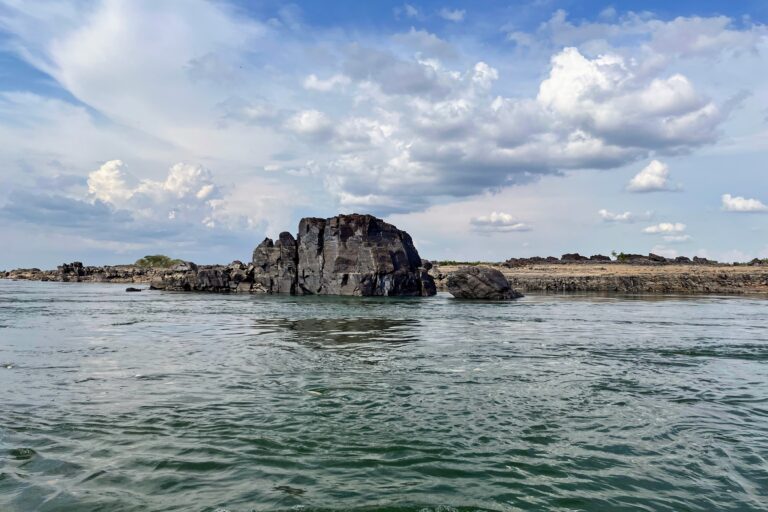The Tocantins-Araguaia waterway is one of the Brazilian government’s priority projects for transporting soy, corn, meat, minerals and other commodities to ports in the Amazon Rainforest. The project calls for more than 2,000 kilometers (more than 1,200 miles) of navigable channels in these two rivers, which cross the Amazon and the Cerrado savanna biomes, and is part of the so-called Arco Norte project, a set of infrastructure plans to improve logistical efficiency in northern Brazil to trim shipping costs. Making these water channels viable requires a series of structural interventions: dredging, rock removal, construction of dams and locks, and port expansion. Public prosecutors and environmental organizations have spoken out against these initiatives, saying they threaten ecosystems and hundreds of traditional communities in six Brazilian states. One of these battles centers on the plan to blow up a natural rock formation called Pedral do Lourenço in Pará state. Spread across 43 km (27 mi) of the Tocantins River, this rock formation is an obstacle to ship navigation during the dry season, from June to December, blocking the passage of boats coming from the Tocantins and Araguaia rivers, which converge just before the formation. The blasts would affect 35 km (21.7 mi) of it. The National Department of Transport Infrastructure (DNIT) plans to create a navigable channel about 100 meters wide in this stretch by blasting rocks, supplemented by dredging before and after the area. In an email to Mongabay, the department said the 36-month project will be carried out by a…This article was originally published on Mongabay
Search
Recent Research
Want your Blog Article featured on our website?
Research
Featured News
Explaining Katsina’s Massive Leap to 2nd Position in the 2025 Climate Governance Ranking
In 2024, during the first edition of the Subnational Climate Governance Performance Rating and Ranking,
COP30: Firm to connect institutions with international climate finance opportunities
SISTME, a climate change and biodiversity conservation consulting firm based in Argentina, has offered to
From resistance to planetary governance, Indigenous women redefine global climate action
While world leaders negotiate behind closed doors in the Blue Zone of COP30, Indigenous Women
Sahara Group Foundation launches 16th Sahara Go Recycling Hub to boost environmental sustainability, economic empowerment
Sahara Group Foundation, the corporate social impact arm of Sahara Group, has commissioned its 16th
Climate finance is the lifeblood of climate action – Simon Stiell at COP30
Remarks delivered by UN Climate Change Executive Secretary, Simon Stiell, at the third High-Level Ministerial
UNDP, REA, GEF commission Plateau solar mini-grid to power agricultural value chains, empower rural communities
The United Nations Development Programme (UNDP), in partnership with the Rural Electrification Agency (REA) and
COP30: Africa urges world leaders to turn pledges into action
Africa has called on the world leaders to turn their pledges into action regarding the
Thousands join global marches calling on govts at COP30 to deliver climate justice
An estimated 30,000 people marched through the Brazilian city of Belém on Saturday, November 15,


